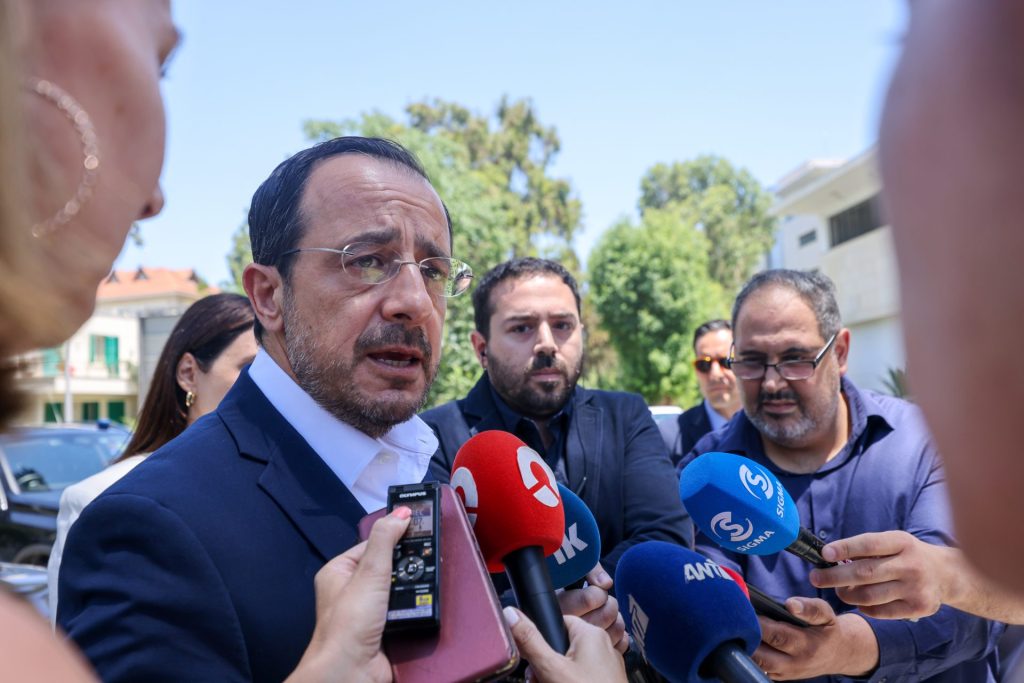President Nikos Christodoulides on Saturday evening insisted that “no one is banned from protesting” in the wake of anger at a heavy-handed response on the part of the police to a protest staged outside the foreign ministry on Thursday night.
“On the contrary, the right to protest is guaranteed and you see that very often, there are such protests,” he told journalists upon his arrival at the rural culture festival in the Limassol district village of Lofou.
“The police have taken a very specific position. What I want to mention from the perspective of the executive branch is that of course, protests and the right of the Cypriot people and every person to demonstrate, to protest, is absolutely respected and guaranteed,” he said.
He then defended a law put forward by the government which passed through parliament in July more heavily regulating protests and other large gatherings of people, after that law, too, came under criticism in the aftermath of Thursday’s protests, before saying he had “nothing else to add on this specific issue”.
Then asked if he had been informed about the matter, he said that he had, and that “a relevant announcement has been issued by the police”.
“The police are constantly being criticised. We must respect the members of the security forces a little, and the conditions in which they operate. I often hear criticism in one direction, and often in the other direction. Of course, everything will be investigated,” he said.
On the matter of any potential future investigation, he said that “if it is found that there was excessive violence or something which should not have been done, of course decisions are made, and for this, there are officers placed on leave”.
“However, we cannot, at the end of the day, not allow the security forces of this country to always operate within the framework of the law,” he said.
Protesters had gathered outside the foreign ministry on Thursday night to demonstrate against Israel’s interception of boats sailing towards Gaza as part of the Gaza Sumud flotilla and detention of their crews.
Demonstrators were met with riot police, who deployed pepper spray after becoming involved in physical tussles with them.
On Friday, Akel had described the police’s response to the protest as an “unprovoked attack” and promised that it “will not go unanswered”, before calling for another protest to be staged at the foreign ministry at 6pm on Friday.
“Akel calls on everyone who does not tolerate state repression and the government’s subservience to the Netanyahu regime to mobilise,” it said.
Volt, meanwhile, said that “violent repression of peaceful demonstrations has no place in a democratic and European country”.
“We condemn the police violence which took place during the peaceful demonstration … in Nicosia. The demonstration was about violations of international law and the illegal military operation being carried out by the Israeli army against the peaceful civilian boats heading to Gaza with food and medicine for the Palestinians,” it said.
It added, “we cannot allow a return to authoritarianism, nor violence against citizens of the Republic of Cyprus who are demonstrating peacefully simply to appease third parties”.
A journalist from newspaper Haravgi said she was among those “hit” by the police, while the newspaper said riot police used shields to push a group of demonstrators back.
Meanwhile, veteran journalist and activist Christos Christofides said he was “thrown to the ground by the unprovoked attack by the police”.
“I thank those who rushed to help me get up before I was trampled by the chaos that prevailed. It is noteworthy that the police team that carried out the attack arrived at the scene after the television channels had left,” he said.
On Friday morning, the union of Cyprus journalists also declared that “the use of force against a journalist in the performance of her duties by the police … is unacceptable and worthy of condemnation”.
It added that the journalist had “indicated her status as a journalist four times”, but said that “despite all this, the police officers continued to use force against her, pushing her and throwing her to the ground twice, while she was also pepper sprayed in the face”.
It also demanded that police chief Themistos Arnaoutis order an investigation into the matter, and said, “the errant police officers must be punished in an exemplary manner”.
“Journalists in a democratic state governed by the ruled of law must be able to carry out their work and mission without hindrance and obstruction,” it said.
The police said the trouble began when a group of demonstrators blocked one lane of the road outside the foreign ministry, and that they had moved in to clear the road.
The protest in Nicosia was a part of wider global protests in response to the interception of flotilla boats and the detention of the crews, with thousands of people taking to the streets in Barcelona, Milan, Dublin, Paris, Berlin, and Geneva, while protests also took place in Istanbul, Buenos Aires, Mexico City, and Karachi.

